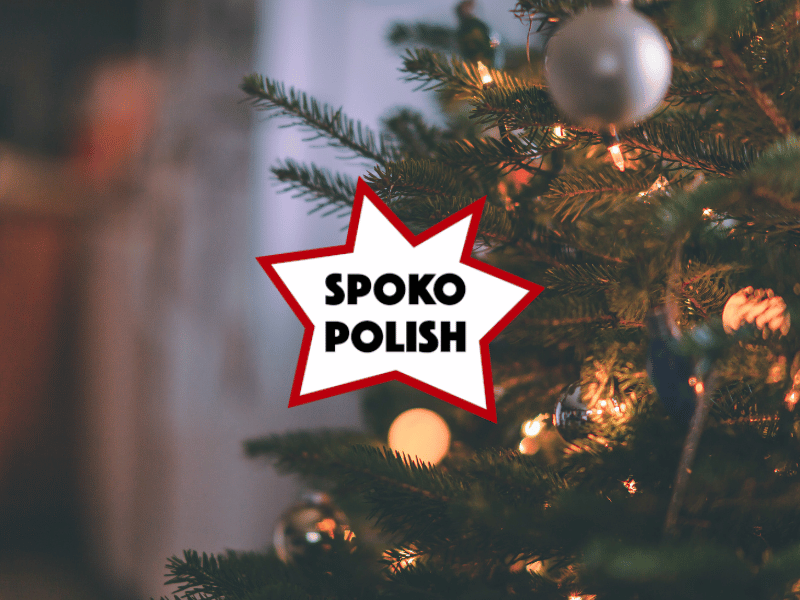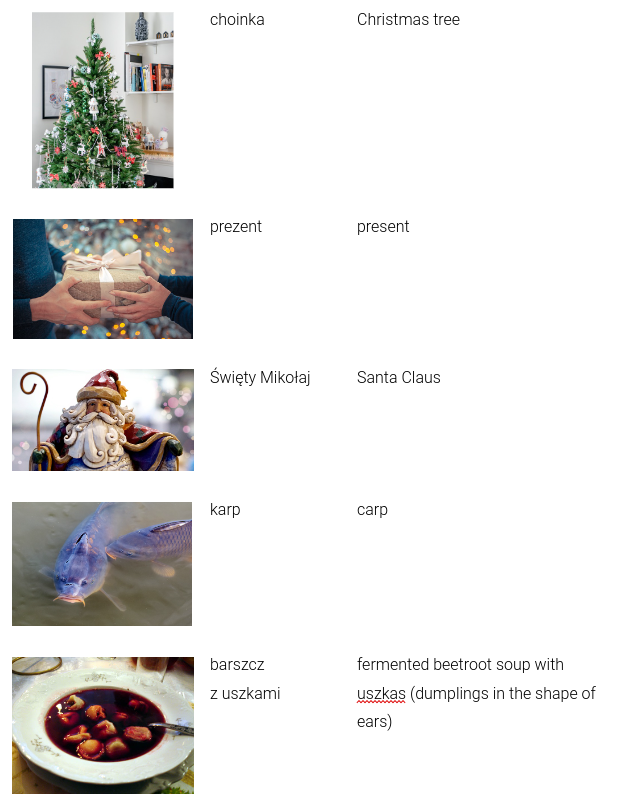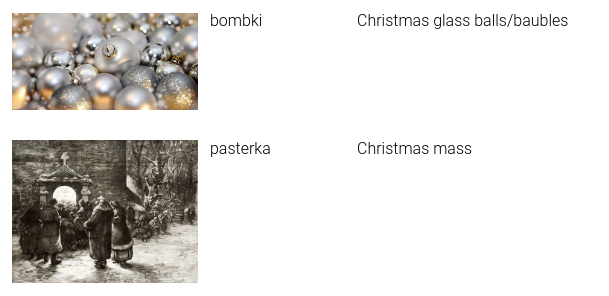
You’re going to a Polish Christmas dinner? Need basic Polish words and phrases to talk to your Polish family and friends? Spoko Polish Christmas elves are here to help you!
The important days related to Boże Narodzenie w Polsce (Christmas in Poland) are:
Mikołajki (Saint Nicholas Day) when we give each other… ekhm Santa gives us small gifts like warm socks or chocolate on the night of the 6th of December.
But the most important is Wigilia (Christmas Eve) on the 24th of December. The time of decorating choinka (Christmas tree), spending time with our rodzina (family) and przyjaciele (close friends) and eating a festive (yet fasting) dinner. Traditionally, the only meat we can eat is fish and in most houses it is karp (carp).
Boże Narodzenie (Christmas Day), also called Pierwszy dzień Świąt is on the 25th and it’s a day off when we eat, eat and spend our time together. Notice that Christmas in Polish is just Święta (“the holy days”, not just any holidays), but the full name is Święta Bożego Narodzenia which literally means the Holidays of the God’s Birth – makes sense, right?
Boxing Day is Drugi dzień Świąt (Second day of Christmas) on the 26th. It’s the day for visiting members of our family we haven’t seen yet this Christmas, like ciocia (aunty), wujek (uncle) and kuzyni (cousins).
But what about the basic vocabulary you’ll need to survive this beautiful time?
First let’s start with Polish greetings and the most important phrases in communication.
For Hello you can use two expressions cześć (less formal, use with people of your generation or younger) or dzień dobry (to elders, more formal).
To say Merry Christmas, you can say Wesołych Świąt or Wszystkiego najlepszego (I wish you all the best).
When someone is offering you more for, they can ask jeszcze? (more?) and you can answer tak, proszę (yes, please) or nie, dziękuję (no, thanks). If need be, you can say nie trzeba (no need) or już (enough/already), if you don’t want more.
If the food is delicious, surely it is, you can say smakuje mi (I like it – about food) or pyszne (delicious).
If you want to help in the kitchen, you can ask Mogę pomóc? (Can I help?). And if someone is asking you for help Możesz mi pomóc? (Can you help me), you can say tak, jasne (yes, sure).
Now let’s have a look at Polish family vocabulary.
mama – mom
tata – dad
rodzice – parents
mąż – husband
żona – wife
siostra – sister
brat – brother
ciocia – aunt
wujek – uncle
kuzyn/kuzynka – cousin
syn – son
córka – daughter
babcia – grandma
dziadek – grandpa
prababcia – great-grandma
pradziadek – great-grandpa
dziadkowie – grandparents
teściowa – mother in law
teść – father in law
teściowie – parents in law
szwagier – brother in law
szwagierka – sister in law
And, last but not least, Christmas vocabulary in Polish


 You can practice Polish Christmas vocab with our Christmas worksheet! There you can find vocabulary, reading practice, more recordings and grammar exercises (for the verbs in the present tense and the genitive case for expressing wishes).
You can practice Polish Christmas vocab with our Christmas worksheet! There you can find vocabulary, reading practice, more recordings and grammar exercises (for the verbs in the present tense and the genitive case for expressing wishes).
And if you’re still hungry, check out our Polish courses for foreigners here.
We provide Polish online courses for small groups and individuals, prepare students for the Polish B1 exam and make sure you learn Polish in a friendly atmosphere – this is the easiest way to learn Polish after all.
Written by Karolina

Leave a Reply